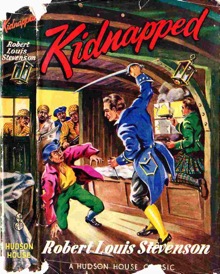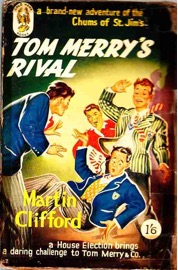John Lane, the London publisher of Eudora Welty’s classic story-collection The Golden Apples, decided in 1952 that sales had slackened too much to justify keeping the work in print. According to Noel Polk’s Eudora Welty – a bibliography of her work (1994), “1175 unbound sheets were sold to “Bear Hudson[?].” How very odd. Perhaps across the world there are copies of John Lane’s edition of The Golden Apples in unusually basic binding.
Did Bear Hudson do that kind of thing often? Apparently, yes. Or at least, it did in 1952. The Reading University literary archives include records from publishers George Allen & Unwin Ltd; in 1952 there was correspondence with “Bear Hudson Ltd who buy remainders from A&U”. Interesting.
A year later, though, Bear Hudson made one last attempt at an orthodox publishing venture.
The Hudson House Classics
After the gap, in 1953-54 there materialised the “Hudson House Classics”. These were five hardcover books reprinting safely out-of-copyright children’s stories such as Treasure Island.
Despite the statement “Published by Hudson House, London” these were clearly Bear Hudson productions. The 1953 dust-jacket spine of Kidnapped carries the familiar logo of the reading bear, and the books were printed by Technical Suppliers Ltd., known to be located at 63, Goldhawk Road, as was Bear Hudson Ltd. itself. 
Not all Hudson House Classics were dated (or indeed showed the bear anywhere). I found a 1954 date for Treasure Island hiding behind the frontispiece, inexplicably avoiding the title and back-of-title pages. Some books may have been reprinted or only bound-up intermittently; their boards can be either red or green.
Then, after these five, nothing. (More Hudson House Classics were said to be forthcoming, but naturally I can’t find any, not even Little Women despite the HHC Good Wives being its sequel.) So there are still questions.
What was Bear Hudson doing after the Forties? Who were the people behind it?
I looked for the people first.
The Assael family
Eventually I found on-line a letter to Peter Haining from researcher Bill Lofts. Although my personal correspondence with Lofts had been very brief, I remembered him as a diligent and much-published researcher into old boys’ fiction and thrillers. He was surely correct in naming the proprietors of Bear Hudson as Albert Assael and Ellie Assael (although their forenames seemed a little variable).
This sent me back to check Steve Holland’s The Mushroom Jungle more carefully. I had read the book on first purchase and consulted it since, but had forgotten its mentions of Bear Hudson. Now it confirmed the names of the directors, and also those of the Bernards directors: Bernard and Sadie Babani, and Albert and Judith Assael (née Babani).
Lofts had noted the family connection with Henry or Harry Assael of Hamilton & Co (Stafford) Ltd., founded 1943, and his brother Sol (formerly Samuel) Assael of John Spencer & Co., founded c.1946. All these firms produced swiftly-written Brit pulp paperbacks with vivid pulp covers.
The Babani family firms
Bernards was not the only Babani family company in publishing. Steve Holland’s invaluable survey reminded me of the firm Brown Watson Ltd., well-known for its paperback genre fiction, and located at The Grampians in Western Gate just like Bernards. In fact, “The directors were husband and wife Bernard and Sadie Babani, who were also directors of the allied company Instructive Arts Ltd. The company [Brown Watson] was taken over by Bernard’s younger brothers, Albert and Solomon …” Later it was run by Albert’s sons Brian and Peter. After they left in 1979, a successor company owned by others continued the Brown Watson name.
As for Instructive Arts, it produced a few early-Fifties thrillers and other items, but these days its later picture books for small children are easier to find. (Evidently Instructive Arts also produced more ephemeral items such as colouring books. One web advertisement shows two of the latter in identical formats, one from “Instructive Arts Ltd.”, and the other from “Treasure Colouring Books”. Don’t go there.)
I found that in the late Fifties the Babani companies of Instructive Arts and Brown Watson had a peculiar close relationship, perhaps not unlike those joint Bernards/Bear Hudson “Cub” books. I refer to certain “Wagon Wheel Westerns”.
Briefly, Instructive Arts published some okay early-Fifties westerns, then alternated with Brown Watson in publishing the “Wagon Wheel Western” paperbacks – if I have this right – until Brown Watson seemed to take over the series completely. (I do not know which firm first set the W-series wheels rolling.) Basically, the episode shows that with these families no single publisher can be considered in isolation.
Goldhawk Road – the neighbours
From the Forties on, the various Assaels and Babanis seem to have remained close neighbours. Like Bear Hudson, Hamilton & Co. at one time operated out of Goldhawk Road, albeit from a different building. (In 1952 some rather good Frank Richards/Martin Clifford school stories from Hamiltons were actually labelled Gold Hawk Books.)
Several of these related firms had a strong and colourful science fiction output, which attracted my young interest long before I had heard of Bear Hudson.
In 1946-7 Hamiltons (Harry Assael) launched two eye-catching but ephemeral sf magazines, their contents evidently dashed off at high speed by – of course – N Wesley Firth. (Perhaps their example inspired Bear Hudson both to try magazines and to avoid science fiction.) Hamiltons then began upgrading appearance and content until it produced some of my favourite early reading in its “Panther Books” and Authentic Science Fiction series.
Meanwhile Spencers (Sol Assael) in neighbouring 131 Brackenbury Road, Hammersmith – an address also used for a time by Grant Hughes – took a different direction with (mainly) the amazing pulp paperbacks of “Badger Books”, often with equally amazing prose by R.L. Fanthorpe.
The Babani firm of Brown, Watson (a little further away at Digit House, Harlesden Road, NW10) supplied much of my more orthodox early science fiction and crime reading in “Digit Books” from writers such as A.E. van Vogt, Kenneth Bulmer and Edgar Wallace.
And the Hamiltons and Grant Hughes co-founder Joseph Pacey was soon responsible for a third firm, namely Curtis Warren, which published a pseudonymous apprentice novel by sf giant John Brunner among 500 less noteworthy items. No doubt many of these young firms were inspired to greater sf productivity by the sudden commercial success of John Russell Fearn’s pseudonymous paperbacks for Scion:
(Oh, for a comprehensive encyclopedia of all these publishers…and not just the sf specialists …)
But the odd thing about the vast science fiction boom of the early Fifties is that the Assaels at Bear Hudson took no part. They had dropped out. Their one original sf offering, back in 1946, had been the curiosity that is The Terror of Timorkal.
They must have been doing other things. [Last and fifth part follows soon…]






Very interested in parts 1-3 and part 5 as my parents were Judith and Albert Assael and the Babanis my uncles and cousins. Too young to really know much about the family publishing history so grateful for any info you may have. Look forward to hearing from you. Best wishes.